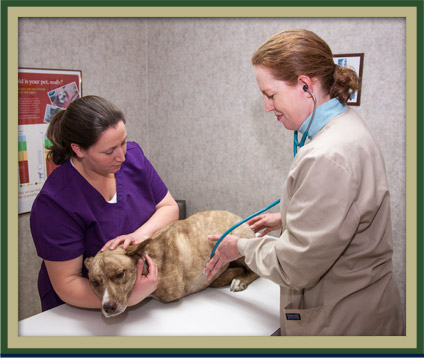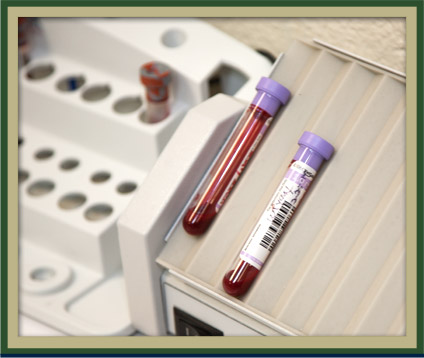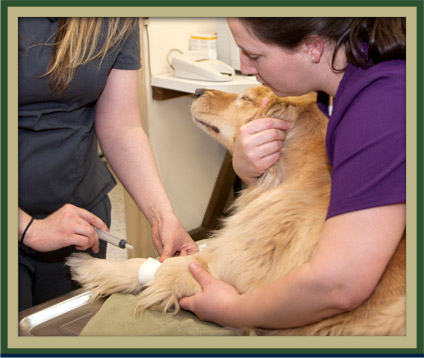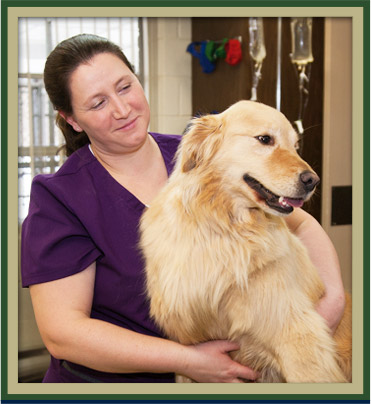Pet Wellness Services
 Wellness Examinations
Wellness Examinations
The staff at Veterinary Medical Center in Everett, PA is committed to providing comprehensive, personalized medical care to your pet so you can enjoy a long, happy life together. As medical professionals, we recognize preventive medicine is the best way to keep your pet healthy and limit the lifetime cost of care. Our goal as pet care professionals is to work with you, the pet owner, to develop the best health care plan for your beloved companion.
The basis of such a plan begins with regular wellness examinations that include thorough screenings for a number of common diseases and ailments that could affect your pet's overall health. As your pet enters his senior years, these screenings become even more important, which is why we have developed a customized senior wellness protocol.
Client/Doctor Communication
When you don't feel well, you visit the doctor and trust that she/he will listen and provide you with reliable information and medical advice. The same goes for your pet. The doctors and staff at Veterinary Medical Center take the time to listen to you and examine your pet thoroughly. We develop a clear picture of your pet's health status and recommend the best health maintenance or treatment program. It is therefore important we hear from you about how your pet is doing so we may continuously adjust and optimize your companion's health care plan. We are here to serve you and your pet's needs.
Preventive Medicine is the Best Medicine
No one likes to see their pet sick. The best way to ensure your pet is well and lives a long life is to promote a healthy lifestyle and be proactive in his/her preventive care.
The veterinary team at Veterinary Medical Center believes prevention is a positive contribution to your pet's long-term health and also minimizes the lifetime cost of veterinary care. We strongly encourage that your pet receives routine wellness examinations, vaccinations, regular laboratory work, deworming and fecal checks, as well as medications to prevent heartworm, fleas, and ticks to keep your pet in optimum health.
Deworming and Fecal Check
Dangerous parasites are always present in the environment. We recommend regular fecal checks and deworming as the best way to prevent parasitic disease and the transmission of intestinal parasites to your pet and your family members.
 Regular Blood Testing
Regular Blood Testing
A complete physical should include a blood test. Not only can a chemistry panel and blood count identify the presence of underlying disease processes, but these tests can also help to create a baseline should your pet become ill between regular examinations.
As part of your pet's regular wellness examination, one of Veterinary Medical Center's veterinarians will:
Listen to your pet's heart - Early signs of cardiac disease such as heart murmurs and abnormal heart beat patterns known as arrhythmias can be heard through a stethoscope. Discovering these initial indicators of an underlying condition can often lead to treatment before the problem becomes a more serious health threat.
Listen to your pet's lungs - Health issues such as infection, obstructive diseases and other problems can be detected by listening to your pet's lungs through a stethoscope. The doctor can also assess the overall pulmonary health of your pet.
Check your pet's teeth and oral cavity - Infection and other forms of dental disease can lead to serious systemic health issues. We also take the time to discuss proper home dental care with you.
Evaluate your pet's vision - Ocular conditions, such as glaucoma, corneal ulcers and dry eye, can be prevented or better treated through regular care and screenings.
Look into your pet's ears - Ear disease is relatively common in many types of pets. Regular examinations can help prevent most forms of ear disease from developing or stop its progression.
Palpate the lymph nodes, abdomen and skin - By feeling these areas, we are looking for unusual lumps or swellings. The skin is also evaluated for discolorations, lesions or patterns of hair loss or thinning, which could be signs of more complicated health issues.
Palpate joints and muscles - By examining the joints, legs and other areas of the body, we can evaluate for swelling, decreased muscle tone and variations in muscle size that may indicate developing orthopedic issues. In older pets, we look for signs of arthritis, which can affect one or more joints and cause lameness, stiffness and joint pain.
 Puppy and Kitten Care
Puppy and Kitten Care
The first year of care for your new puppy or kitten is the most important. Like human infants, puppies and kittens require special attention for them to grow and develop well.
Our team of veterinarians and technicians partner with you to create a custom health plan so your new companion receives the vaccinations and examinations required to get the best start in life.
Your puppy and kitten's first year of care will include:
Physical Examinations - Your puppy's or kitten's lifetime of wellness starts with its first comprehensive physical exam. Puppies and kittens should have 3-4 exams between the ages of 8-16 weeks. These visits are important because they provide our veterinarians with an opportunity to assess your pet's overall health and to administer vaccines.
Vaccinations - Due to their developing immune systems, puppies and kittens must receive a series of properly staged vaccines. Because every puppy and kitten is unique, we tailor our vaccination recommendations based on their lifestyle and/or breed and according to the suggested medical guidelines.
Diagnostic Testing - Puppies should be tested for Heartworm and kittens tested for Feline Leukemia and Feline AIDS.
Additional Recommendations - We build extra time into your puppy or kitten's first examination for any questions or concerns you might have. Your veterinarian will also discuss and recommend other services, such as spaying, neutering and microchipping.
Senior Care
Older pets make wonderful companions, and thanks to advances in veterinary medicine, pets are living longer than ever. But your senior pet has medical needs that are very different from puppies and kittens. The veterinarians and medical team at Veterinary Medical Center work with you to develop a health care plan that ensures your pet is safe and happy throughout his or her golden years.
Pets age faster than people and are considered to be seniors around age 7. Prevention is the key to keeping older pets healthy, which is why we offer wellness blood monitoring for pets over 7 years old. Symptoms of disease or a chronic condition many not be readily apparent. In some cases conditions that may look like the usual signs of old age could actually be signs of a more serious problem, such as arthritis, periodontal disease, kidney failure or cancer. We recommend all senior pets undergo at least one physical examination each year, though more frequent examinations are encouraged. During an examination, we also perform a number of tests that can detect the signs of heart disease, infection, diabetes and other health problems.
You are an important ally in keeping your senior pet healthy! If your pet is experiencing any changes in behavior, we urge you to bring him or her in for a check-up. Together, we can make sure you and your faithful companion enjoy many more years together.
 Vaccinations
Vaccinations
Vaccines prevent diseases that were once responsible for the death of many dogs and cats. They prepare your dog or cat for exposure to certain viruses and bacteria, so when exposed, the immune system can destroy the invaders before the body becomes overwhelmed.
During the first few months of life, a series of vaccinations for both puppies and kittens is necessary. This is due to several factors; the immune system of the young animal is not fully developed and maternal antibodies (protection from the mother) neutralize the vaccine.
Sometime between age 6 weeks to 20 weeks, the maternal antibodies disappear and the puppy's/kitten's immune system begins functioning. For this reason, vaccination every three weeks is considered the safest way to ensure protection for your young pet. As the maternal antibodies disappear and the immune system begins functioning, your pet needs fewer vaccinations.
Vaccinations are also important for keeping adult pets healthy and free from disease. However, not every pet requires the same series or frequency of vaccines. At Veterinary Medical Center, our veterinarians determine a vaccination protocol based on your pet's lifestyle, susceptibility to disease, geographic location, and the most current recommendations from the American Veterinary Medical Association. Our goal is to maintain optimal health and protection while not over-vaccinating your pet.
Core Vaccines for Dogs and Puppies
Distemper Vaccine (DHLPP) - This combination vaccine protects against the following four diseases: Distemper, Hepatitis, Leptospirosis, Parainfluenza and Parvovirus.
Lyme Disease - Carried by ticks, Lyme Disease is extremely prevalent in certain parts of the country, including Pennsylvania.
Rabies - The Rabies virus is fatal and all warm-blooded animals (including humans) are susceptible to infection. Most states require rabies vaccinations by law for puppies and dogs alike.
Other Available Vaccines for Dogs and Puppies
Bordetella ("Kennel Cough") - The bordetella bacteria causes an extremely contagious upper respiratory infection. This may be recommended based on environmental factors.
Canine Influenza - Outbreaks of this disease are most often seen in animal shelters and boarding kennels.
Core Vaccines for Cats and Kittens
Feline Respiratory Disease (FDRT) - Feline respiratory disease is caused by feline viral rhinotracheitis and feline calicivirus. This vaccine protects against both of these diseases.
Feline Leukemia - We highly recommend that any outdoor cats be vaccinated for feline leukemia.
Rabies - The Rabies virus is fatal and all warm-blooded animals (including humans) are susceptible to infection. Most states require rabies vaccinations by law for kittens and cats alike.
 Flea and Tick Prevention
Flea and Tick Prevention
Fleas and ticks are more than a nuisance; they carry diseases dangerous to both you and your pet. Fleas can transmit tapeworms, and often you can see segments of the tapeworm in your pet's stool. In our region, ticks can carry a variety of serious illnesses, including Lyme disease. Ticks tend to thrive in wooded areas or in high grass. It is often difficult to keep your pets away from tick-infested areas, so if they go exploring, check them when they come inside.
Flea and tick problems can be avoided by using parasite prevention products that are available at our hospital. At Veterinary Medical Center we carry topical preventatives (Frontline, Revolution) and oral tablets (Credilio, NexGard, Bravecto). We'll discuss the best options with you during your wellness appointment.
Heartworm Prevention
Heartworm disease is a serious, life-threatening condition affecting dogs and, to a lesser extent, cats. Mosquitoes spread the disease by injecting the parasite into your pet at the time of the bite.
Clinical symptoms of heartworm disease develop very slowly. Lack of energy and exercise intolerance are early symptoms, as are coughing and difficulty breathing. Because heartworm disease is increasing in frequency and is a serious and deadly disease, we recommend your dog be tested annually.
Heartworm disease prevention is simple and effective. For dogs, a once-a-month heartworm preventative can be given as a tasty, chewable treat. This same chewable medicine prevents not only heartworms from developing, but also kills and prevents most other types of worms that can infect your dog. Cats are protected by applying a drop of heartworm prevention liquid to the skin once-a-month. We recommend this to prevent heartworm disease as well as fleas, ear mites, and other types of worms that can infect your cat.
If you would like to have your pet tested for heartworm disease, or if you would like additional information on how best to protect your pet from this dangerous parasite, please call Veterinary Medical Center today for an appointment.
 Exotic Animal Care
Exotic Animal Care
The skilled staff of Veterinary Medical Center offers optimum wellness care programs for rabbits, ferrets, gerbils, rats, mice, hamsters and guinea pigs. Since it is often difficult to determine if an exotic pet is ill, we strongly recommend physical examinations twice a year to check for health problems plus annual monitoring to check for nutritional and husbandry-related conditions.
To survive attacks from their predators, exotic animals normally conceal their illnesses in the wild. As a result, their medical problems often go unnoticed for long periods of time. By the time you recognize there is a problem with your exotic pet, the condition is often extremely serious. With bi-annual medical examinations by a veterinarian at Veterinary Medical Center, problems are often diagnosed before they become serious medical conditions.
After acquiring your new exotic pet, the team at Veterinary Medical Center strongly recommends scheduling a complete wellness appointment. This exam includes a thorough physical examination, husbandry and nutritional consultation, disease screening and laboratory testing if necessary. Before bringing your pet into your home, it's important to make sure he or she is healthy.